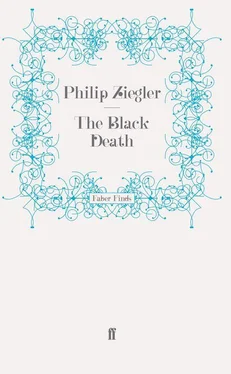To appreciate the full impact of so fearful a calamity on an ignorant and credulous people calls for an intense effort of historical imagination. Some glimmering of what it was like might be gleaned from the reactions of the people of London and Coventry or, still more, of Dresden and Berlin in the face of prolonged and devastating air-attack. In these cases a pattern of crowd behaviour has been established. There was an initial reaction of anger directed against the enemy, exhilarating, almost euphoric, with vows of vengeance and pride in the courage and solidarity which the victims of the bombing displayed. Then there might be panic, a brief breakdown of morale and the capacity to produce discipline or rational responses to external stimuli. And finally came apathy and indifference; a grudging though often successful adaptation of life to the needs of the new situation.
But with apathy came rancour and suspicion; doubts about the other members of society with whom, so recently, they had felt united in suffering. Suspicions of the rich: the more prosperous parts of town, said the poor, were mysteriously spared by the raiding bomber – this proved that some sinister understanding existed between them and the enemy. Suspicions of the rulers: they only kept the war going so as to grow fat on arms sales or for some other selfish end. Suspicions of the doctors: they saved their drugs for themselves or their privileged friends. Suspicions of the shop-keepers: they hoarded their precious goods to sell at a profit to the undeserving who could afford to pay. Class looked askance at class; neighbourhood at neighbourhood. Loyalties retracted: to the street; to the family; ultimately to oneself.
The analogy between twentieth-century air-raid and medieval pestilence obviously breaks down at many points. Baehrel has suggested that the Revolutionary Terror in France produced the same defence reactions in those who endured it as were to be found in the plague-struck Europeans of 1348 or, for that matter, the victims of the cholera epidemic of 1884. {245} The conclusions which he draws are strikingly similar to those derived from a study of the blitz. A belief in plots; a conviction that someone has to be made the scapegoat for everything; were almost always the chosen outlet for surplus passions. Whether aristocratic emigré or Jewish poisoner, bourgeois tool of a reactionary clique or incompetent doctor,
…the suspect came to the fore; a suspect who was not the same for all. For the well-fed the suspect was the poor man because he was dedicated to the plague; for the lower classes the suspects were the rich, in whom they were quick to identify the propagators of the disease. For some the leading suspect was the surgeon… for others, the beggar…
And yet neither the blitz nor the Revolutionary Terror yield an adequate impression of the psychological shock which medieval man endured. For where there is a common, identifiable enemy then there must be a sense of camaraderie; it matters little who the foe may be, to hate him will provide relief and bulk larger in the mind than the pettier grudges that divide one from one’s neighbours. The first fine flower of anger against the emigre aristocrat or the marauding bomber might, in time, lose its capacity to excite or inspire but it survived as an element lending cohesion to the attacked. Medieval men had no one to hate. They might work off their resentment in campaigns against the lepers or the Jews but few of those who sacked the ghettoes can have believed that, by their deed, they were doing more than tinker with the instrument of their destruction while leaving the root cause untouched. The Black Death was the work of God, and against God they could not fight.
The only defence against the plague in which the doctors had the slighest faith was flight from the afflicted area. This the poor knew, and yet they knew too that it was a defence to which they could have no recourse. As the poor of Genoa, Florence, Paris or London saw the rich and privileged bundle up their most precious possessions and flee the cities it would have been astonishing if they had felt no resentment, no sense that they were being deserted and betrayed. With such a mood abroad it was inevitable that the processions of the Flagellants would quickly take on a revolutionary tinge, that the houses of the magnates would be sacked and the clergy abused, derided or even assaulted.
There is little chapter and verse to illustrate the upsurge of class hatred which arose during the plague. ‘Before 1789’, wrote Baehrel in explanation of this in France, ‘this sentiment of hatred left few traces: the poor rarely use a pen.’ But subsequent epidemics have made it clear how quickly the feelings of the underprivileged could be embittered. During the cholera epidemic of 1832, when slightly greater sophistication if not tolerance might have been expected, the Parisian mob rioted through the smarter quartiers , accusing nobles and bourgeois not only of suffering less seriously from the disease but of poisoning their impoverished fellow-citizens into the bargain. Who can doubt that the vastly more credulous and worse afflicted poor of the fourteenth century must have felt the same rancour and suspicion? If they failed to sack the houses of the rich it can only have been because the torpor induced by famine and misery had already broken their spirits before the plague began to work on their emaciated bodies. But, in the last analysis, the most noticeable feature of the Black Death was not that some escaped but that everyone was to some extent involved and paid the price of involvement. For the months which the Black Death lasted it must have seemed to those who suffered that everything was discredited and at an end. The doctors could cure nobody and, by their efforts, made themselves a laughing stock. The Church was impotent to defend itself or its faithful and had resort only to muttered objurgations about the sinfulness of mankind. The rulers abandoned their palaces and their responsibilities and left their people to die in misery. And the Black Death spared nobody.
Sceptre and crown
Must tumble down
And in the dust be equal made
With the poor crooked scythe and spade.
Death had always been a preoccupation of medieval man; now it became an obsession. Always he had known that in time it must come to everyone but never before had the fact been brought so forcibly to his attention. Never before had those set in authority over him been shown so clearly to be no braver, no better, no wiser and no less vulnerable. Like every other lesson, it was to be forgotten but, at that moment, it must have seemed that its memory would never fade.
* * *
It is impossible that England should have been spared such tensions but even the somewhat scanty evidence for their existence which is to be found in the countries of continental Europe is lacking this side of the Channel. The maltreatment of the Bishop of Bath and Wells, which was mentioned at the beginning of this digression, could possibly have had such an origin, yet equally some quite different factors, of which we now know nothing, may have been responsible. A monk was beaten up in Winchester yet, as we shall see, there was good and sensible reason for his misfortune. {246} A spirited battle between monks and townsmen took place in Hull but such affrays, in Hull, were practically a local sport and call for no special explanation. The excesses of the Flagellants found no favour with the people of London and the few Jews who still lived in England were left in peace. The Bishops were constantly at work to whip up penitential fervour and not to curb it. A few incidents of panic or violence can be culled from the contemporary chronicles but nothing remotely suggestive of mass-hysteria.
Can one deduce from this that the Englishman, in the face of quite as grave a danger, proved more phlegmatic or better disciplined than his continental contemporary? It would be hazardous to push the argument too far. To argue that something must be true because of lack of evidence to the contrary is always dubious. When the evidence either way is as scanty as in England of the fourteenth century it would be folly. But what can be said with fair confidence is that any widespread movements on the scale of those experienced in Spain, France or Germany could not have escaped the attention of the chronicler. For one reason or another the Englishman did not indulge in the massive disorders in which others found an outlet for their emotions.
Читать дальше












